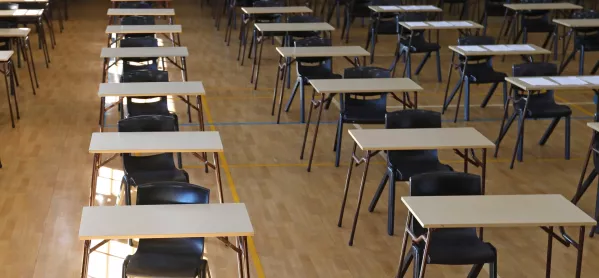Ofqual board minutes published today offer a glimpse into what was happening behind the scenes as the regulator took the momentous decision to U-turn on this summer’s exam grades.
The papers offer a step by step guide into how the controversy evolved, from the inside.
On one occasion, the Ofqual board met three times in one day to discuss reverting to centre-assessed grades (CAGs).
Grading fiasco: How the DfE bounced Ofqual into mocks plan
Exams crisis: Ofqual knew GCSE and A-level results were ‘unreliable’
Watchdog: Ofqual board discussed Collier’s exit in her absence
The GCSE and A-level results U-turn: A timeline
The key developments are below:
- Wednesday 13 May, 12 noon: Ofqual raises concerns that schools could game the system or submit unconsciously optimistic grades for GCSEs and A levels. It concludes that the best way to address this is to rely on its standardisation algorithm rather than the CAGs submitted, in larger schools.
- Tuesday 11 August, 3pm: Scottish education secretary John Swinney announces a U-turn on results, with all downgraded results withdrawn.
- Tuesday 11 August, 8.45pm: Ofqual holds an emergency board meeting to discuss DfE proposals for a “triple-lock” process, where “students would be able [to] accept their calculated grade, appeal to receive their mock results or sit the autumn exams”. During the meeting, then chief regulator Sally Collier calls education secretary Gavin Williamson, who urges that the issue be “resolved quickly”.
- Tuesday 11 August, 10.30pm: DfE issues a press release announcing the “triple-lock” process while the meeting with Ofqual is still ongoing.
- Thursday 13 August, 3.30pm: On A-level results day, students are bitterly disappointed by grades far below what they had expected, with 39 per cent of teachers’ grades moderated down.
- Friday 14 August, 3.30pm: Ofqual board resolves to allow an appeal on the basis of a student having a valid mock or non-exam assessment result which was higher than their calculated grade. But on a successful appeal, the grade awarded should not exceed the student’s CAG.
- Saturday 15 August, 8.30pm: Ofqual chair Roger Taylor and Ms Collier are asked by Mr Williamson to reconsider the watchdog’s position that grades awarded on mock appeals should be no higher than CAGs (the “CAG cap”).
- Sunday 16 August, 1pm: Ofqual board resolves to scrap the CAG cap.
- Sunday 16 August, 1pm: Board also instructs Mr Taylor to have “further discussion” with Mr Williamson about awarding CAGs, indicating the board’s “increasing concerns” and opinion that this was becoming the “inevitable course”.
- Sunday 16 August, 5pm: Mr Taylor reports that Mr Williamson’s view “at this stage” was that it “would be better not to move [to] centre assessed grades (CAGs)”, but instead to allow mock appeals with the previously proposed CAG cap.
- Sunday 16 August, 5pm: Board says delivery of mock appeals process was in “serious doubt at this late stage”.
- Sunday 16 August, 5pm: Board makes “preliminary conclusion” that reverting to CAGs is “preferred option”.
- Sunday 16 August, 5pm: Mr Taylor indicates that he will communicate with the education secretary “immediately” about the board’s recognition that it would likely be “preferable to issue CAGs in order to avoid the possibility of reissuing guidance only to have policy change once again within a short space of time”.
- Sunday 16 August, 9.30pm: Mr Taylor updates board on communication with Mr Williamson. He says he has indicated to the education secretary that the board was minded to consider moving to CAGs.
- Monday 17 August, 4pm: Ofqual announces a major U-turn on grading, with teacher-assessed grades to stand in most cases.
- Thursday 20 August: GCSE results day arrives, with the U-turn meaning record numbers of top grades.
- Sunday 23 August, 6pm: In Ms Collier’s absence, the Ofqual board notes that it would need to “act swiftly” to rebuild the watchdog’s reputation in the event of her resignation.




